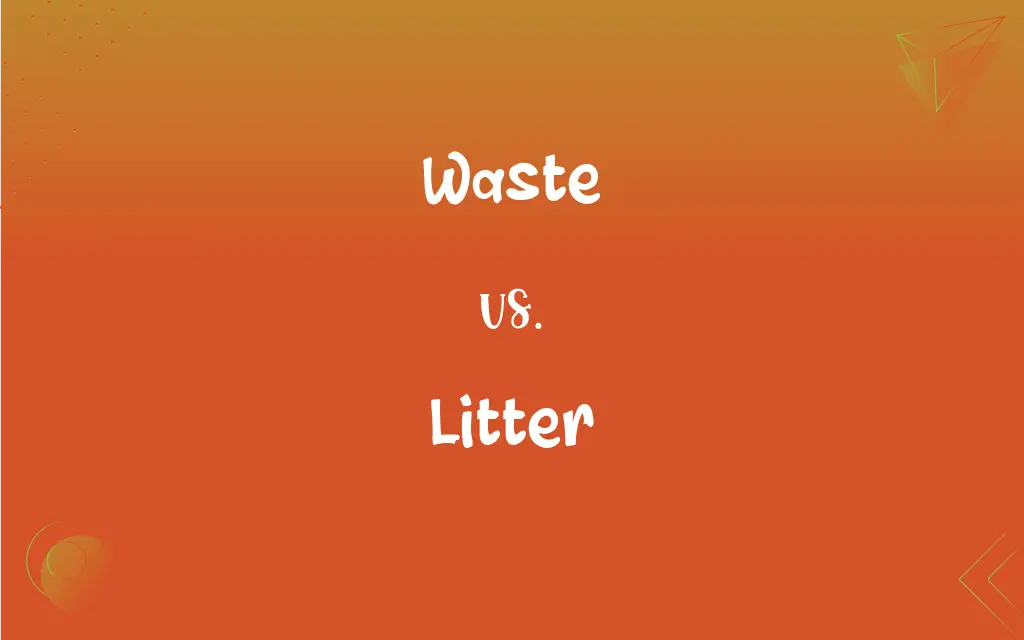Waste vs. Litter: What's the Difference?
Edited by Harlon Moss || By Janet White || Updated on November 18, 2023
Waste refers to unwanted or unusable materials, while litter is waste improperly disposed of in an inappropriate place.

Key Differences
Waste encompasses materials deemed no longer useful or required after the completion of a process, highlighting its broad scope that includes domestic, industrial, and commercial refuse. Litter, conversely, specifically denotes waste that has been disposed of improperly, often in public spaces, reflecting a disregard for environmental and civic norms.
The management of waste involves processes like collection, transport, processing, recycling, or disposal, as part of public health and environmental practices. Litter, in contrast, often escapes these organized systems, ending up in streets, parks, and natural habitats, thus becoming an environmental and aesthetic issue.
Waste can vary in nature, from biodegradable to hazardous, necessitating diverse treatment and disposal methods. Litter, however, is typically characterized by items that are frequently and carelessly discarded in public areas, such as packaging, bottles, and cigarette butts.
The production of waste is an inevitable consequence of human activities and consumption patterns. Litter, on the other hand, is a behavioral issue, stemming from individual choices to disregard proper waste disposal practices.
Waste can be a resource when recycled or reused, its potential value is often lost when it becomes litter, harming wildlife and polluting landscapes. Hence, while all litter is waste, not all waste necessarily becomes litter.
ADVERTISEMENT
Comparison Chart
Definition
Unwanted or unusable materials.
Waste disposed of improperly in public places.
Source
Generated from various human activities.
Results from individual actions of improper disposal.
Environmental Impact
Can be managed through recycling and treatment.
Directly harms environment and wildlife.
Societal Perception
Seen as a by-product of consumption.
Viewed as a result of irresponsible behavior.
Legal Implications
Subject to waste management regulations.
Often illegal, with fines for littering.
ADVERTISEMENT
Waste and Litter Definitions
Waste
Material no longer needed or used.
The factory disposed of its industrial waste safely.
Litter
Small items scattered in disorder.
Litter on the streets makes the city look unkempt.
Waste
Unnecessary or excessive use.
Wasting electricity is not good for the environment.
Litter
Waste products that have been disposed of improperly.
The park was full of litter after the concert.
Waste
Deterioration or depletion.
The old mansion was left to waste away.
Litter
To make a place untidy with scattered waste.
Please don't litter the beach with plastic.
Waste
Material left over after a process.
The construction site had piles of waste material.
Litter
To give birth to multiple offspring at one time (for animals).
The cat littered five kittens.
Waste
To use something carelessly.
He wasted his inheritance on frivolous purchases.
Litter
A collection of objects lying about.
His room was littered with clothes and books.
Waste
To use, consume, spend, or expend thoughtlessly or carelessly.
Litter
Carelessly discarded refuse, such as wastepaper
The litter in the streets after a parade.
Waste
To cause to lose energy, strength, or vigor; exhaust, tire, or enfeeble
Disease wasted his body.
Litter
A disorderly accumulation of objects; a pile. “An iron washstand [stood] in the corner amidst a litter of soap and soiled towels” (Molly Gloss).
Waste
To fail to take advantage of or use for profit; lose
Waste an opportunity.
FAQs
What is litter?
Litter is waste that is improperly disposed of in public or open spaces.
Can all waste be recycled?
Not all waste is recyclable; it depends on the material and local recycling capabilities.
How does waste impact the environment?
Waste can pollute the environment if not properly managed or treated.
What are the consequences of littering?
Littering harms wildlife, pollutes habitats, and degrades the aesthetic of places.
What is the impact of litter on urban areas?
Litter in urban areas can lead to health hazards, pest infestations, and reduced quality of life.
What is waste?
Waste is any material that is discarded after use or is deemed unusable.
Are there different types of waste?
Yes, waste can be classified as organic, recyclable, hazardous, and more.
Is littering illegal?
Yes, littering is often illegal and can result in fines or penalties.
How can we reduce litter?
Reducing litter involves public education, proper waste disposal, and increased enforcement.
What is waste management?
Waste management involves collecting, transporting, processing, recycling, and disposing of waste materials.
Can littering affect water quality?
Yes, litter can pollute water bodies, affecting both wildlife and human health.
How does waste affect climate change?
Improper waste management can lead to greenhouse gas emissions, contributing to climate change.
What is a landfill?
A landfill is a site for the disposal of waste materials by burial.
What types of waste are most harmful?
Hazardous waste, like chemicals and batteries, is particularly harmful to the environment.
How does litter affect animals?
Litter can harm animals through ingestion, entanglement, and habitat destruction.
Why is it important not to litter?
Not littering helps protect the environment, wildlife, and maintains cleanliness.
What role do individuals play in waste management?
Individuals can contribute by reducing waste, recycling, and disposing of waste properly.
What is the most common type of litter?
Common litter items include cigarette butts, plastic bags, and food wrappers.
Can waste be converted to energy?
Yes, certain waste types can be converted into energy through processes like incineration.
Can reducing waste save money?
Yes, reducing waste can lead to savings in disposal costs and promote sustainability.
About Author
Written by
Janet WhiteJanet White has been an esteemed writer and blogger for Difference Wiki. Holding a Master's degree in Science and Medical Journalism from the prestigious Boston University, she has consistently demonstrated her expertise and passion for her field. When she's not immersed in her work, Janet relishes her time exercising, delving into a good book, and cherishing moments with friends and family.
Edited by
Harlon MossHarlon is a seasoned quality moderator and accomplished content writer for Difference Wiki. An alumnus of the prestigious University of California, he earned his degree in Computer Science. Leveraging his academic background, Harlon brings a meticulous and informed perspective to his work, ensuring content accuracy and excellence.
































































